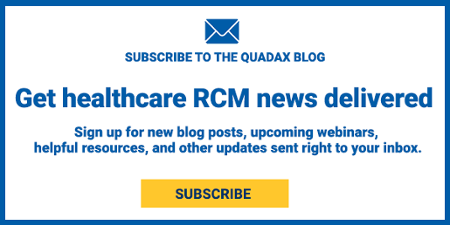Protect Your Lab: Key Strategies for Compliance and Medical Necessity Adherence.
Clinical laboratories today face increased scrutiny regarding compliance and medical necessity. Our recent webinar, featuring Danielle Tangorre, a partner in Robinson & Cole LLP’s Health Law Group and Tom Cronin, SVP of Revenue Cycle Strategy & Analytics for Quadax, delved into these critical areas, offering valuable insights for laboratories seeking to maintain operational integrity.
The presentation emphasized that a robust compliance program is not merely a suggestion but a necessity. The OIG's updated guidance underscores the importance of a proactive approach, encompassing seven key elements: comprehensive policies, dedicated leadership, consistent training, clear communication, complaint resolution, disclosure protocols, and stringent enforcement. Crucially, these elements should be woven into the fabric of daily operations, fostering a culture of compliance from the top down.
Beyond the Basics: Risk Assessment and Mitigation
Identifying and mitigating risks is paramount. Common risk areas include referral relationships, transactional arrangements, and interactions with telehealth companies. Medical necessity, a frequent target of audits and investigations, requires meticulous attention to data collection, medical policies, and billing practices. Staying abreast of special fraud alerts and ensuring marketing materials align with regulatory standards are also vital.
Medical Necessity: A Deeper Dive
Medical necessity, the cornerstone of compliant billing, necessitates a thorough understanding of Medicare's standards and payer policies. Labs must navigate the complexities of medical policies, recognizing that the absence of formal coverage determinations does not negate the requirement for services to be reasonable and necessary. While labs typically follow physician orders regarding medical necessity, they too hold responsibility for not billing for services they know are outside of intended use or not medically necessary.

Practical Strategies for Revenue Cycle Management
From a revenue cycle perspective, the webinar offered practical strategies for managing medical necessity, distinguishing between standard and complex medical necessity. Leveraging technology, such as APIs for real-time edits, can help identify non-covered tests and ensure compliance with payer policies. Moreover, proactive physician education and denial monitoring are essential for mitigating risks and maintaining revenue integrity.
Responding to Audits: A Proactive Approach
Audits are time-sensitive and can be very time consuming, but identifying audits promptly through AI and OCR technology, prioritizing medical record requests, and leveraging automated work queues will ensure the audit requirements are met within the deadline date.
Key Takeaways:
- Proactive Compliance: Build a strong compliance culture with written policies, training, and open communication, and review on a regular basis.
- Targeted Risk Management: Identify and address risks in referrals, billing, and marketing.
- Medical Necessity Adherence: Understand your payers and medical policies.
- Data-Driven Decisions: Use analytics to monitor denials and quickly identify claim issues.
- Efficient Audit Response: Implement self-audit systems for rapid identification and response.
To gain a comprehensive understanding of laboratory compliance and medical necessity, and to learn how to implement these best practices within your organization, watch the on-demand webinar.
Disclaimer: This overview provides general information and practical tips for consideration. It is not intended as a substitute for professional legal advice. Consult with qualified legal counsel for guidance specific to your situation.


